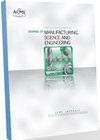基于3D增材制造锚的cfrp -金属连接建模与实验验证
IF 2.4
3区 工程技术
Q3 ENGINEERING, MANUFACTURING
Journal of Manufacturing Science and Engineering-transactions of The Asme
Pub Date : 2023-08-29
DOI:10.1115/1.4063110
引用次数: 1
摘要
碳纤维增强聚合物(CFRP)与金属之间的连接技术在许多需要优化重量、刚度和强度的结构力学领域(如航空、汽车、能源发电和生物力学)具有重要意义。因此,使用不同的方法制造了几种类型的金属复合接头,其中3D金属锚解决方案引起了人们的广泛关注。本研究通过初步的有限元模拟(FEM)和实验验证,对CFRP和Inconel 625之间通过激光粉末床熔合(LB-PBF)添加剂工艺生产的接头进行了评估,评估了应用于单搭接接头的不同锚固几何形状。提出的模型增加了复杂性。采用均质化方法确定了金属锚杆与碳纤维布占据的节点区域的等效性能。该模型还支持拓扑参数化,以评估锚的几何形状对结构特性的影响。该研究为不同锚固面拓扑结构在拉伸荷载作用下的节点强度提供了实验验证。本文章由计算机程序翻译,如有差异,请以英文原文为准。
Modeling and Experimental Validation of CFRP-Metal Joints Utilizing 3D Additively Manufactured Anchors
Abstract The joining techniques between carbon fiber reinforced polymer (CFRP) and metal are of great importance in many areas of structural mechanics where the optimization of weight, rigidity, and strength is a necessity (such as aeronautics, vehicles, energy generation, and biomechanics). As a result, several types of metal–composite joints have been manufactured using different methods, with the 3D metal anchor solution attracting significant attention. This study evaluates different anchor geometries applied to single lap joints through preliminary finite element method (FEM) simulations and experimental validation on joints between CFRP and Inconel 625 produced via a laser beam powder bed fusion (LB-PBF) additive process. The models proposed increase in complexity. The homogenization process is employed to determine the equivalent properties of the joint region that is occupied by metal anchors and CFRP. The model also supports topology parametrization to assess the impact of anchor geometry on structural properties. The study provides experimental validation of joint strength under tensile load for various anchoring surface topologies.
求助全文
通过发布文献求助,成功后即可免费获取论文全文。
去求助
来源期刊
CiteScore
6.80
自引率
20.00%
发文量
126
审稿时长
12 months
期刊介绍:
Areas of interest including, but not limited to: Additive manufacturing; Advanced materials and processing; Assembly; Biomedical manufacturing; Bulk deformation processes (e.g., extrusion, forging, wire drawing, etc.); CAD/CAM/CAE; Computer-integrated manufacturing; Control and automation; Cyber-physical systems in manufacturing; Data science-enhanced manufacturing; Design for manufacturing; Electrical and electrochemical machining; Grinding and abrasive processes; Injection molding and other polymer fabrication processes; Inspection and quality control; Laser processes; Machine tool dynamics; Machining processes; Materials handling; Metrology; Micro- and nano-machining and processing; Modeling and simulation; Nontraditional manufacturing processes; Plant engineering and maintenance; Powder processing; Precision and ultra-precision machining; Process engineering; Process planning; Production systems optimization; Rapid prototyping and solid freeform fabrication; Robotics and flexible tooling; Sensing, monitoring, and diagnostics; Sheet and tube metal forming; Sustainable manufacturing; Tribology in manufacturing; Welding and joining

 求助内容:
求助内容: 应助结果提醒方式:
应助结果提醒方式:


